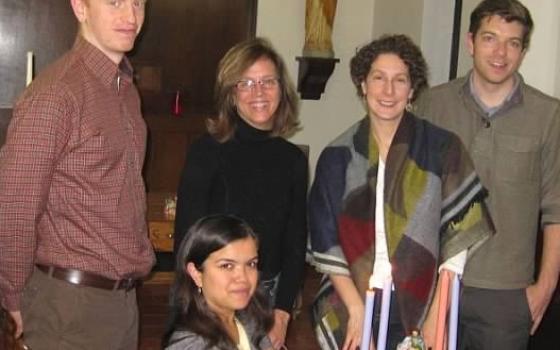Having entered a religious community in 1966, I am definitely among the "old wine" comfortably settled into the biblically referenced old wineskins (Mathew 9:17), a well-worn garment that cannot be repaired by a patch of new cloth. It is not a complaint, merely a fact. My years have been rich, maybe even well-matured. But to encounter new wine — a new form of religious community and service — old traditions with new structures — is an exciting event. And when I visited the Benincasa community in New York City recently that's what happened: I found a new wineskin, a new piece of cloth.
I had met Karen Gargamelli, the founder of Benincasa, about a year ago when she was exploring with a group of sisters (old-winers) her aspirations for gathering a spiritual community grounded in the Dominican tradition but adapted to the realities of young laity today. I was both admiring and doubtful. But new life is built on vision not doubt; Karen and like-minded dreamers were resolute. Desire was scratched into a proposal, the proposal circulated with a magnetism that drew support, and footwork began. Needs included space, co-community members, a definite plan, star-up labor, and wisdom. Eventually the rental of a former convent was secured, a long underused space. It required deep renovation but had the capacity to accommodate a core community, hospitality needs and an adjunct community of the Dominican Volunteer lay mission program.
I had envisioned my December visit as an "interview" to explore progress from initial hopes to realities of early beginnings. The dynamism of the group dispelled any notion of formality. We simply sat, shared bread and engaged in conversation, meeting whoever entered as the evening came on. Sean and Karen, a public school teacher and not-for- profit housing lawyer respectively, were present from the core community; Jimmy, a teacher, would arrive later. Also present were Laura, a temporary artist-in-residence, Zach a musician who had become a friend of the community, and an overnight guest, Debbie, from the Future Church organization. Later two house friends, peace poets, passed through after action for Human Rights Day. My head kept spinning as I tried to keep up with each one. Moving from kitchen to dinner table I was regaled with an assortment of founding "stories" and "miracles" that are building a foundational identity. My preconceived thoughts that enthusiasm might be dampened by difficult growing pains were set aside as I realized that sometimes we old wineskins fail to expect or vision boldly enough!
I heard of how dreams became choices based on their defined vision. When the church disallowed female preaching at the community's opening celebratory Mass, the community simply (well, maybe not so simply) changed venues, moving the event into their crowded house to uphold a principle of no discrimination based on gender. After all, their Dominican inspiration, Catherine Benincasa (St. Catherine of Sienna) is a Doctor of the Church, gender no matter!
To my listening ear, such decisions are how the community is continuing to develop. I found many structures familiar to my long tenure in religious life — daily prayer with psalms and reflection, communal meals, commitment to hospitality, central focus on service, common study, contemplation and discussion toward spiritual growth. But the choices of this community are not predicated on pre-defined structures but rather on ongoing discernment with a new eye to the specific needs and spiritual hungers of the laity today. Despite Vatican II affirmation that the laity are essential in accomplishing the mission of the church, the laity continues to experience alienation, second-class status, and isolation in terms of opportunities for spiritual growth! Sometimes, sadly, they are actively blocked by an old system. The community expresses it this way: that many young lay persons are "starving in the parishes."
Discernment, even when cultivated informally around kitchen conversation, demands energy. While many desires are common, life experiences are diverse, leaving world views and concrete decisions complex. There is a determination to model acceptance and to journey as they are. For this they have the guidance of monthly meetings with three Dominican sisters who bring long experience to anchor the new energy.
Beyond personal and professional commitments, the community schedule is full. Benincasa continues a tradition of sharing, study, and nurturance with monthly dinners modeled on experiences with a Jesuit community. Parish involvement includes organizing the Sunday soup kitchen and coordination of some services for elderly homebound parishioners. The community explores liturgical models and initiates social activist campaigns. They even host occasional musical concerts. Communal financial arrangements are a time consuming work in progress. A sustainable food supply is being developed through connection with an organic farm. As activities multiply, questions arise: "What does hospitality look like?" or "How do we critique our experience and give breathing room for exploration?"
Withal they express trust, using the phrase "what you need is at the table." Indeed from unexpected sources they have experienced abundance; the right person showing up at the right time with the exact something needed, big or small. With ambiguity and fluidity they continue. Sean expresses a sense of mission to "nourish vocations in real and radical ways." Another affirms a belief that lay Catholics can feel the "kick of the Holy Spirit" in the revitalization of church.
I left that December evening after common prayer. Walking out in to the night, I looked back through the window of their house, a warm light in large city, a curious name on the door. I held the memory of the group within: a small courageous band of lay professionals forging a pathway of love and good. What an exquisite taste of new wine! Blessing on this house and all who enter in.
[Sr. Clare Nolan is the International Justice Training Coordinator for the Sisters of the Good Shepherd, an international woman’s religious congregation that is involved in providing social services in about 70 counties, with a particular focus on women and girls in vulnerable situations.]


